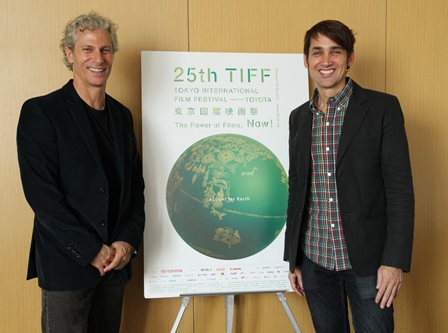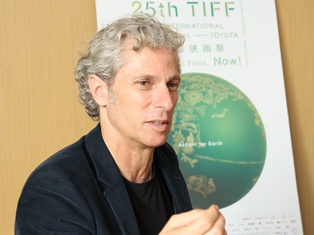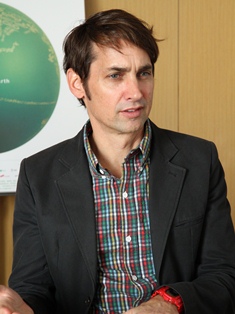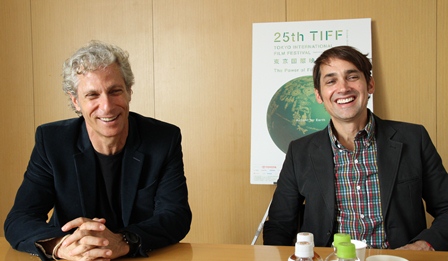Interview with Directors Scott McGehee and David Siegel (“What Maisie Knew“)

“What Maisie Knew” is a modern adaptation of a classic Henry James story. Maisie is caught between a rock and a hard place as her parents are splitting. The simple and strong domestic tragedy is brought to life for the 2010s by directing pair Scott McGehee and David Siegel. We chatted about collaborations, the stunning performance by 6-year-old Onata Aprile as Maisie and a few other things.
– You two have been directing films for a while. I’m interested in the process of how you two work together. Do you divvy up the duties? Or is there some other magical thing that happens?
David Siegel: It’s not that magical. We just sort of do it together. We didn’t go to film school, so when we were figuring out… and this was a long time ago – we’ve been working together for 23 years. We just kind of figured out our own process. Scott was going to be an academic. He was doing Japanese film studies at Berkeley and I was finishing an MFA at RISDE (Rhode Island School of Design). We know each other through his sister Kelly, who I met at the Art Institute of San Francisco. She still works with us. She’s our production designer. So we had no one there to tell us what to do. We didn’t know anything about filmmaking other than what we liked in movies. I had a background in photography, so I knew how to expose film a little bit. Scott took a weekend course at the Film Arts Foundation in San Francisco.

Scott McGehee: Something like the equivalent of the Northwest Film Forum [in Seattle].
Siegel: So we started figuring it out from there. I don’t think it’s so dissimilar from the way the Coens work or other teams – there aren’t many of them and there aren’t many that have lasted as long as we have who aren’t related to each other. It’s not so mysterious. We just do it together.
– Does someone, like, take a certain role?
McGhee: Definitely on set, David’s more forward. He takes the dominant, forward position and I definitely take the back position. Kind of listening, kind of consulting.

Siegel: Did you say insulting?
McGhee: Yes, insulting.
Siegel: “You call that a shot?” “What kind of note was that to give an actor?”
McGhee: We really do trust each other and rely on each other and do it together. That’s the model and that’s generally how it goes day to day.
– Speaking of actors, you’re obviously working with some of the best actors in the world…
Siegel: … and we’ve been very fortunate that way.
– … and you’ve pulled out some of their best stuff… in Julianne Moore, Steve Coogan and the newcomer, Johanna Vanderham. But, of course, the star of the film is Onata [Aprile]. Could you tell me a bit about working with her?
McGhee: She really ranks right up there with everyone else in terms of her innate abilities.
Siegel: She’s just an extraordinary child. She was six years old when we were making the movie and she came packed with talent. Sometimes we sound like we’re going overboard when we talk about Onata, but hard to really overstate what an extraordinary presence she was on the set. What was extraordinary was, sort of in a way, her unextraordinariness. She was just simply happy to be there. She was simple and natural in her scenes. She brought a generosity of spirit, in a way, to everything that she did. She almost never lagged and it infected everyone around her and made everyone feel they were making something special. I often say you have experiences that with other human beings in your life, sometimes where you really can’t express enough gratitude to them. And it’s a strange thing to say about a 6-year old child. That’s really what happened.
McGhee: I agree. She was blessing. She really was. We set out on the journey of making this movie without knowing we had her. Thinking back, that’s seems the most foolhardy thing to set out to do is to make this movie without knowing who that 6-year old is going to be – the fulcrum that everything turns on, the person who’s in every scene, who basically carries the whole film on her little back. We didn’t know we had an extraordinary little girl when we started the process. Had we not found one, we would have failed.
– How did you find her?
Siegel: Just in casting. Avy Kaufman brought her in to read. We were close to shooting. We were over 3 weeks away from shooting, so we were getting pretty nervous and Avy kept saying, “Relax. You’re going to find the perfect girl.” But we didn’t have a backup at that point it was like “Avy, we don’t have that perfect girl!” We were in the production office and she called and she said, “You have to come down right now.” And we did and we knew almost immediately. Of course, we got cold feet over the next week, worrying if it was the right choice, is it the right choice? Immediately upon seeing her and meeting here we looked at each other and thought, like, that’s the first one we could really imagine being Maisie.
– Susanna and Beale are incredibly self-centered. And it’s their flaw or their problem. Lincoln and Margo are younger, working their ways through life. They have a genuine love for Maisie. Do you think that people like Lincoln and Margo would change into people like Susanna and Beale. Is it their natures to be different, or do you think the cold hard world turns people into career-oriented self-centered beings?
McGhee: That’s way too much philosophy!
– I can imagine Beale and Susanna at some point in their lives being loving, caring people.
McGhee: I not sure they ever were. I’m not sure what to expect for Margo and Lincoln, or Maisie for that matter.
Siegel: We end the movie in motion, right? Scott and I believe really strongly in process. In the process of things. We believe in the process of the work. If you go into filmmaking interested in the results, you’re bound for a life of pain, because the making of the thing is… the thing. In that sense, the movie is about experience – the experience of the child. The movie’s told through the eyes of a child and we hope to convey, to some degree, the experience of a child. But in that, we hope you get a slice of, or a little window into those moments of the adults around her as well. You can say, “What will Margo and Lincoln become?” We don’t know what they’ll become, but we get to understand those moments of becoming in relation to the child. We see beautiful things both in Margo and in Lincoln. You can hope for or think about what the process in their lives might be. And you also see some degree of redemption and thought on the part of Beale and Susanna as well.
– You see Masie in motion. You see her getting her boat trip, the thing that’s been promised to her that she hasn’t been getting for so long, it’s like, she’s going to get on that boat.
Siegel: But she doesn’t get to the boat. She’s on the way to the boat.
McGhee: And you see her getting to the boat.

Interview by Nicholas Vroman



















